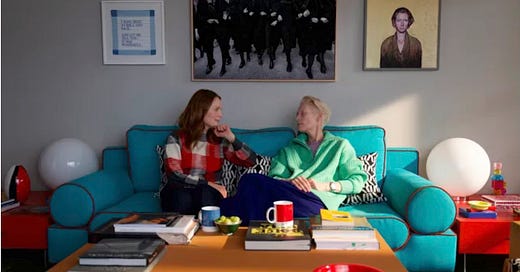No contemporary director has matured more spectacularly than Pedro Almodóvar. Beginning as the wild child of the Spanish Movida Madrileña, which erupted after the death of General Franco, he has gradually broken ties with the counterculture and emerged as a maker of subdued, thoughtful dramas. The Room Next Door is Almodóvar’s first English-language film. It won the Golden Lion at this year’s Venice Film Festival and may expect to gather more silverware as the awards season continues.
It's the kind of film that could only be made by a director of a certain age who has seen friends and contemporaries succumb to cancer or another mortal illness that strikes with terrible randomness. It’s a story about one woman facing her own death, and the friend she asks to stay with her, as she takes matters into her own hands.
Ingrid, played by Julianne Moore, is a successful author who appears to write fictionalised versions of history. When she hears that her old friend, Martha, a wellknown war reporter, is in a New York hospital being treated for cancer, she pays her a visit. Tilda Swinton is lean enough to play the role of a cancer patient, and at this early stage she is filled with hope that a new treatment is working.
Soon Martha discovers it has been a failure, and she has only a short time to live. The doctors are willing to try further treatments, but the patient is not. Martha is determined to die with dignity, and a certain style. She rents a comfortable, modern house in Woodstock, roughly two hours drive from Manhattan, and asks Ingrid to remain with her to the end. She has acquired a pill on the dark web that will put an end to her life whenever she chooses. The uncomfortable part for Ingrid, is that Martha has no fixed timetable. She will go whenever she thinks the moment is right, closing her bedroom door as the signal that it’s all over.
Ingrid confesses to a fear of death and has to overcome her own anxieties to accompany Martha on this final journey. The other friends whom Martha asked, have all refused, so Ingrid feels she has no choice. The bulk of the storyline revolves around the friends’ conversations, as they look back over their lives. They have even shared a lover, Damian (John Turturro), who is still connected with Ingrid, even though she doesn’t admit this to Martha. When she leaves the house occasionally, Ingrid meets with Damian, who gives her advice about what she needs to do to avoid legal problems.
Martha tells Ingrid about her life, about the boyfriend who came back from Vietnam psychologically scarred, and the child they had. She talks regretfully about her estrangement from her daughter, Stella (Sarah Demeestere), and admits she has been a poor mother. It’s clear that her life as a war correspondent was not only an embrace of danger, but a flight from responsibility.
The viewer is drawn to identify with Ingrid. With her, we provide an audience for Martha’s reflections. We share the same tense feelings, wondering when and how the deed will be done. If this sounds depressing, you’ll have to take my word this is not the case. The power of this film lies in the strong, central performances of Moore and Swinton, and in Almodóvar’s skill at telling the story. Whenever there’s an obvious route, he finds a way to edge us off to one side, to add new details that complicate our reactions.
Take Damian, for instance, who has just delivered an apocalyptic lecture on the effects of global warming. He tells Ingrid he has become obsessed with this issue, growing angry and intolerant of those who don’t recognise the magnitude of the danger – even his own son. If Martha is dying in the most positive frame of mind, Damian is prey to a constant stream of negative thoughts. She is focussed only on her own mortality; he is distressed about the state of the planet. Is one right and the other wrong? Inevitably, we’re led to feel that it makes more sense of concentrate on your own brief span than to carry the weight of the world. A week or two of happiness seems more attractive than a life filled with gloom and rage.
Ingrid is writing a book on the British artist, Dora Carrington, who committed suicide after the death of Lytton Strachey, to whom she was devoted. The fact that Strachey was homosexual gives her love an ideal aspect. When Ingrid thinks of Carrington, she thinks of Martha choosing to leave the world on her own terms, not in despair but with a sense of joyous resignation.
Another recurring motif is a passage from the end of James Joyce’s story, The Dead: “His soul swooned slowly as he heard the snow falling faintly through the universe and faintly falling, like the descent of their last end, upon all the living and the dead.”
Martha can recite these lines by heart, and insists on watching John Huston’s film version of the story. It’s comforting to her because it suggests death is slowly descending on everyone, like flakes of snow. She’s not alone on her journey, or in her final weeks. She has a friend in ‘the room next door’ who will support her to the end, lending validation to her decision, tidying up the remnants of her life. It’s an act of faith for both women that friendship is the antidote for death’s sting. The film leaves us with a much sharper sense, not only of how we might cope with death, but how we should face life.
The Room Next Door
Directed by Pedro Almodóvar
Written by Pedro Almodóvar, after a novel by Sigrid Nunez
Starring: Julianne Moore, Tilda Swinton, John Turturro, Sarah Demeestere, Alessandro Nivola, Esther McGregor, Alex Høgh Andersen, Victoria Luengo
Spain/USA, M, 107 mins




